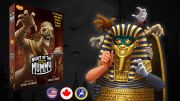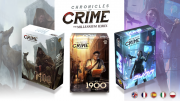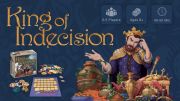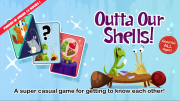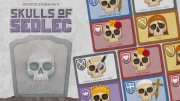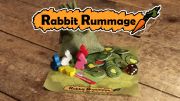Trekking the World (Underdog Games) – From the makers of the Mensa Select winner Trekking the National Parks, comes a game of trekking the globe. On your turn you discard at least one trek card to move your pawn. The value on the cards determines how many spaces you can move. You may pick up a souvenir cube from the location you move to (if there is still one present at that location). Players earn points for collecting the most of specific souvenir types. On your turn you also choose one of three additional actions. You may draw two trekking cards, spend trekking cards to go on a tour if the tour card is currently available in the display and you are at the correct location (completed tours are worth points at the end of the game), or you can spend the necessary trekking cards to activate one of the two journey cards which gives you a special ability to perform.
Casual Game Crowdfunding: Adventures, Mummies, and Rummaging Rabbits

Despite the raging Coronavirus pandemic, some great games are up for funding on Kickstarter this month — offering mysteries, social deduction, and a chance to explore the world at your game table. There are also icebreakers and set collection games. And best of all: rabbits!
Night of the Mummy (Blue Beard Entertainment) – The sequel to Dracula's Feast (though it can also be combined with that game), Night of the Mummy is a hidden roles game. Each turn you choose another player and ask if they are a specific role or ask them to dance. When you ask about a role, that player passes you either a yes or a no card (however some roles will lie about their identity). When asked to dance, a player may choose to accept it or not. If they accept, all other players close their eyes and you and the player you asked reveal your role cards to each other (though depending on your role card a player may end up only showing the back of their card instead), if your request to dance is rejected, you may ask another player about their role. When you believe you know each player's role, you may accuse. If you get everyone's role correct, you win the game, otherwise the game continues with your own identity revealed. Each role in the game has its own unique ability.
Chronicles of Crime - The Millennium Series (Lucky Duck Games) – These three new standalone games in the Chronicles of Crime line can be played independently and do not require the original game. Each of The Millennium Series games takes place at a different moment in time (1400, 1900, and 2400). In the core game system, players solve mysteries, scanning QR codes on cards and using an app to travel from location to location and investigate the scenes, examine clues they find, and question suspects. Each of the three games in the Millennium Series also includes new mechanics to the gameplay: such as a new puzzle system, cybernetic implants which can help in your investigations but can change the way suspects interact with you, and vision cards which give you glimpses into mysterious scenes. You can read our review of the original here.
King of Indecision (Analog Game Studios) – Players are trying to fulfill the king's requests. The only problem is, he is constantly changing his mind about what he wants. On your turn you may take three actions, choosing from a total of six. You can explore (adding a tile to the board and placing on it its matching resources), move (move your pawn to an adjacent tile), collect (pick up a resource token from your present location), trade (turn two resources into a different type), offer (give goods to the king for points, however you may only give the goods that he is currently looking for), or hire a worker (pay resources to hire an additional meeple which in turns allows you to take more actions). You can read our preview of the game here.
Outta Our Shells (Humanature Studios) – From the co-creator of the classic video game ToeJam & Earl, comes a new family friendly, super-casual, ice-breaker card game. There are three stacks of cards on the table: question cards, fortune, and Cat or Rat cards. You always have three fortune cards in your hand, some of which are good fortunes and some are bad: the goal is to end up with three fortunes that you are happy with (though this is very much not a game about winning or losing). There are three rounds on your turn. You draw a question card and then answer it. Next is the Cat or Rat round. You choose another player and each draw two Cat or Rat cards. Each card lists a series of choices, two of which are randomly selected and the player you chose must choose which one they prefer, however you first get to guess which one you think they chose. If you guessed right, you keep the card, otherwise it is discarded. You then do the same thing again, but with the roles reversed, and continue until all four Cat or Rat cards that were drawn this round have been used. Whenever you have three Cat or Rat cards, you may turn them in to draw a new fortune card. During the final round of your turn, the player to your right randomly draws one of your fortune cards and either keeps it or discards it (if they keep it, they discard one of their own fortune cards) and then you draw a new fortune into your hand. Players are encouraged to stop playing whenever they feel they’ve had enough.
Skulls of Sedlec (Button Shy) – In this new wallet-sized game, players are building stacks of skulls. There are eighteen cards, with each card divided in half, with a skull depicted on each half. There are five different types of skulls in the game. You shuffle the cards and create the graveyard by creating six stacks of three cards each. At the start of the game, you flip one card face up on any one pile. On your turn you take one of three actions: dig (flip any two face down cards in the graveyard, and take one into your hand), collect (take one revealed card from the graveyard into your hand) or stack (place one card from your hand into your stack). The hand limit is two, so if you already have two cards, you must choose to stack. When building your stack on the table, you must place each new card either next to a card on your bottom row, or above and between two cards. The game ends once all cards have been placed. Each skull scores based on its type. Royal skulls score for each peasant skull beneath it in the stack, priest skulls want to be spread out across multiple levels, romantics wish to be paired with each other, criminals score for being adjacent to priests, and each peasant is worth one point regardless of placement.
Rabbit Rummage (Toby Fairclough) – Rabbit Rummage is a pocket-sized game that comes in a neat little bag and features adorable rabbit meeples. Each player chooses a bunny meeple and places it along the edge of the board. A food token is placed face-up on each hexagonal space on the board. On your move you roll a die, and move your bunny up to that many spaces from hexagon to hexagon, grabbing the token on the space where you stop. The rabbits move around the board, collecting the food tokens, until they have all been taken. There are six different types of food, each of which scores in different ways.
Disclosure: unless otherwise noted, we have not seen or played any of the above games. Our assessment of each is based on the information given on the crowdfunding project page.





